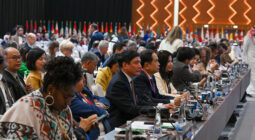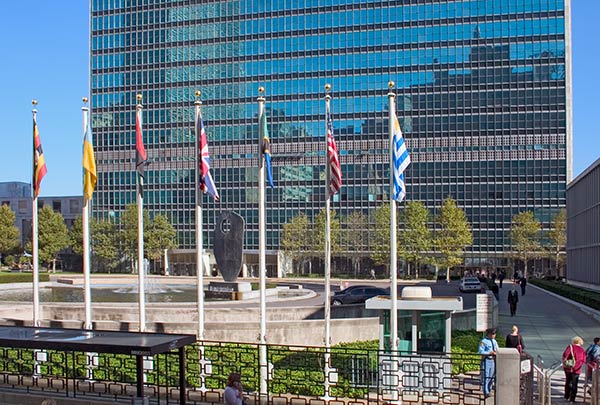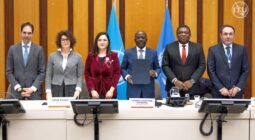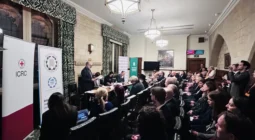

Parliamentary Hearing at the United Nations: Re-thinking Sustainable Development
This Annual Parliamentary Hearing aimed to provide a parliamentary contribution to the on-going debate at the United Nations and in capitals on the development agenda after 2015, when leading development commitments are set to expire. Entitled Re-thinking sustainable development: the quest for a “transformational” global agenda in 2015, the Parliamentary Hearing was able to channel the views of parliamentarians directly into the UN’s deliberative processes on determining Sustainable Development Goals (SDGs).
The hearing was also able to build on the outcome of the 128th IPU Assembly in Quito as well as other deliberations held by the United Nations, particularly those of a High-Level Panel of the Secretary-General. The meeting also considered the role of parliaments in the implementation of the new commitments for sustainable development as a universal agenda for both developed and developing countries.
This was my second time attending the Annual Parliamentary Hearing at the United Nations, having also participated in 2011. I welcomed the opportunity to renew acquaintances with the UK Ambassador and Permanent Representative to the UN, Mark Lyall-Grant who I called on to discuss the UK’s wide-ranging UN agenda and hear about key current challenges facing the UK Mission.
The Annual Parliamentary Hearing, organised as a joint activity between the Inter-Parliamentary Union and the UN, was opened by Mr John Ashe, President of the General Assembly, Mr Nestor Osorio, President of the UN Economic and Social Council and Abdelwahad Radi, President of the IPU. They set out the main objectives for the two day conference as being to better determine a vision on what should be the key elements of a set of goals to replace the current Millennium Development Goals when they reach their 2015 deadline. In determining these new goals, priority was given the appropriate accommodation of gender issues, working with the private, public and charitable sectors and recognising the importance of balancing growth, consumption and production vs. sustainability. The importance of close cooperation between the UN and IPU was confirmed by the ECOSOC President who called on all parliamentarians to contribute to the formulation of the post-2015 development agenda over the next 18 months, highlighting the importance that climate change be given significant priority.
First Session: “A new economic model for sustainable development: the path toward well being”.
A panel comprising the Danish and Kenyan Ambassadors to UN, a National Assembly Member from Ecuador and Prof. Tim Jackson from Surrey University discussed prospects for adopting a new model for sustainable development, with a key emphasis on assessing the ultimate well-being of communities and individuals.
The panel suggested that GDP growth should not be the sole guiding criteria for moving out of poverty and overall well-being was a key consideration given perpetual growth could be unsustainable when resources were finite. They argued that the pursuit of growth could be counterproductive and create unsustainable consumption and sustainable prosperity provided a more useful goal for development. The panel’s discussions highlighted that under alternative models of development, economic growth should not assessed on resource usage and financial considerations alone. The prosperity and well being of people should be also be a key success factor. The example was given that 80 percent of the profits of the oil industry in Ecuador was reinvested in people-centred activities.
Second Session: “Gender as a linchpin of development: how to frame a new goal?”
The panel for this session consisted of the Icelandic and Guyanan Ambassador to UN, the President of the Bolivian Senate and the Assistant Secretary General of UN Women.
The panel members spoke of their own experiences and of how diversity and gender equality is central to each of their own nations. It was noted that Bolivian Senate has over 50% female members and women now have access to land title which was previously denied as was access to credit. A question raised was whether gender equality should be a standalone goal or whether it was a cross-cutting factor. The consensus was that it should be cross-cutting and there should not just be one single goal linked to gender equality. The panel also highlighted how violence against women was a key obstacle to the achievement of gender equality. The panel noted that gender equality was not about a loss for men, but rather a gain for all. Panellists also took the strong view that men needed to be at the table when discussing these issues.
Third Session: “Democratic governance for sustainable development: what place among the new goals?”
The panel was formed by Deputy Secretary-General of the UN, the Swiss and Costa Rican Ambassadors to UN, the Tanzanian Speaker, a Senator from Pakistan and the former Swedish Minister for Development.
The Swedish participant discussed what was meant by democratic governance at the national level but also highlighted that global governance was also important. She added that a new social contract is needed and with higher numbers of people seeking active participation, democratic processes have become increasingly important. The processes for choosing new development goals should follow a democratic path and good governance helps to serves to overall goal of sustainability. The rest of the panel discussion centred on accountability, transparency and participation, all the way from the grass roots to the international level. The Senator from Pakistan was negative about western countries turning its back on his country, saying his country sought trade rather than aid. The issue of trust was repeatedly raised as a crucial factor in ensuring good governance.
I took the opportunity during this session to make a statement on the importance of good governance and the IPU’s strong record in promoting good democratic process. I argued that we cannot assess or understand levels of poverty in countries where there is closed governance. I also mentioned the 0.7% of GDP contribution made by the UK for international development. I made the point that good governance should feature prominently in the post 2015 development agenda. I also made sure I mentioned my constituency of Dartford which might well have been the first time it has been specifically mentioned at the United Nations!
Fourth Session: “Parliament and the new post 2015 agenda: getting ready for implementation”.
The panel comprised the Austrian Ambassador to UN, the Speaker of Bangladesh, a Belgian Senator and the Assistant Secretary-General of UNDP.
It was noted that not every member country of the UN will be able to be part of the implementation of the new development goals but all would be consulted. A key consideration was that Parliaments will have a key role in ensuring implementation. Some countries have several governments; Belgium, for example, is a federation of governments and this complexity might create additional challenges for implementation. The public was unaware that development goals also apply to developed countries as well as developing ones and public education about the process would be important. Work should begin now on preparing for the new post-2015 agenda rather than sitting back and waiting for its adoption. The important role for parliaments in the post-2015 process would bring about greater levels of interaction between parliaments and the UN system which would benefit both sets of institutions.
Further details on the 2013 Annual Parliamentary Hearing are avilable from the IPU Website












